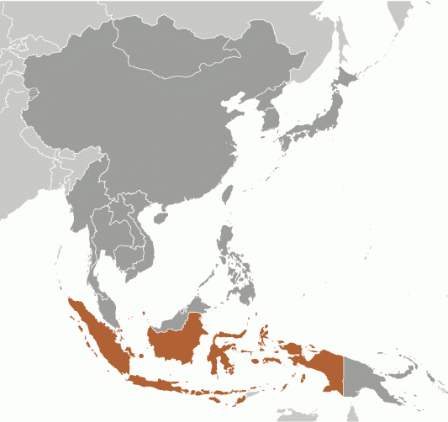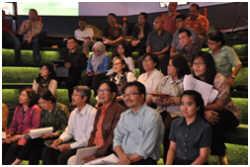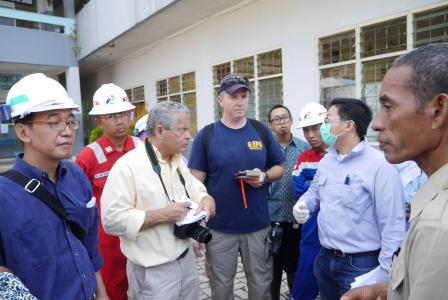EPA Collaboration with Indonesia
Collaborating for a cleaner and healthier tomorrow.

Indonesia is a key actor in the global environmental arena, with significant ecological resources and importance in Asia. EPA and Indonesia are working together to support environmental planning and law enforcement, reduce methane emissions, improve air quality, and clean up contaminated sites. EPA is partnering with Indonesia's Ministry of Environment and Forestry on many of these programs.
Explore our work with Indonesia:
- Building Strong Institutions and Legal Structures
- Combating Climate Change by Limiting Pollutants
- Improving Air Quality
- Reducing Exposure to Toxic Chemicals
- Cleaning Up Electronic Waste
Building Strong Institutions and Legal Structures

Effective Environmental Planning: EPA and Indonesia recognize that assessing the environmental impact of development is critical for strong environmental protection. Environmental impact assessment (EIA) is a tool to integrate economic and environmental concerns when planning for development of infrastructure. Since 2013, EPA and Indonesia's Ministry of Environment and Forestry (MoEF) have organized a series of distance learning programs on EIAs and related topics. The learning programs have included representatives from government agencies, universities, and private companies.
Based on these programs, MoEF is developing new policies to engage the public in commenting on EIAs and streamline procedures to ensure safe and effective land use planning.
Learn more from these EIA Distance-Learning Videos:
- Scoping for Environmental Impact Assessments
- Strengthening Information Access and Screening Analysis for Environmental Assessments to Enhance the Effectiveness of Environmental Permits
Addressing Violations of Environmental Law: EPA and MoEF also recognize the importance of addressing violations of environmental law through effective environmental enforcement.
In December 2014, EPA, MoEF, and the U.S. Department of Justice provided environmental enforcement training to over fifty Indonesian enforcement officers, prosecutors, and civil servants. This was the first enforcement training to bring together participants from all over Indonesia and from multiple agencies. Participants gained knowledge about inspection techniques and began to develop strategies for how to partner with other agencies during investigations.
In addition, EPA and MoEF are active in the Asian Environmental Compliance and Enforcement Network (AECEN), which brings together enforcement officials from 13 countries to improve compliance with environmental laws and policies in Asia.
Learn more:
Combating Climate Change by Limiting Pollutants
EPA and Indonesia are active members of the Global Methane Initiative (GMI), a public-private initiative that advances the abatement, recovery, and use of methane as a clean energy source. Through the GMI, EPA experts have shared models and technological approaches to help Indonesia’s Ministry of Energy and Mineral Resources address methane emissions in the oil and gas sector.
This cooperation has led Indonesia’s methane measurement team to conduct methane inventory studies with oil and gas companies, and to evaluate future actions to reduce emissions nationwide.
Learn more:
Improving Air Quality for a Healthier Tomorrow
 Indonesian officials visit an air quality monitor to learn more about U.S. air quality management practices.
Indonesian officials visit an air quality monitor to learn more about U.S. air quality management practices.Partnering with Jakarta: EPA and Indonesia are committed to improving air quality and protecting human health, particularly in rapidly growing urban centers like Indonesia’s capital city of Jakarta. EPA is partnering with the City of Jakarta and the Indonesia Ministry of Environment and Forestry (MoEF) on “Breathe Easy, Jakarta,” a program to improve public health and air quality in the city.
Through the program, Indonesian officials have participated in trainings and technical cooperation on air monitoring, modeling and inventories; gained greater knowledge of successful approaches to improving air quality; and enhanced local air monitors.
Monitoring Air Quality: Fine particulate matter (also referred to as "PM 2.5") is visible to the human eye as haze and can impact respiratory health. In partnership with EPA, U.S. Embassy Jakarta operates air quality monitors which measure PM 2.5. As a result, residents are able to stay informed about real-time air quality conditions.
Learn more:
- U.S. Air Quality Index
- U.S. Embassy Jakarta's Air Quality Monitor
- Watch: A Breath of Fresh Air, Exit recording of an air quality event hosted by U.S. Embassy Jakarta (2015)
Promoting Clean Fuels: Fuel with high sulfur and lead content can have significant impacts on human health. Through the Partnership for Clean Fuels and Vehicles (PCFV), EPA has worked with Indonesia to promote increased availability and use of clean fuels and vehicles.
Building on our successful partnership to phase out lead in gasoline in the 1990s, we are now working with partners in Indonesia to promote cleaner air through improved transportation programs, such as the use of soot-free buses.
Learn More:
- Watch: The Switch to Low-Sulfur Fuel: A Critical Step for Improved Urban Air Quality, Exit recording of an air quality event hosted by U.S. Embassy Jakarta (2016)
- EPA's efforts promoting cleaner fuels and vehicles worldwide through the PCFV
- Climate and Clean Air Coalition Heavy Duty Diesel Initiative’s efforts in soot-free urban bus fleets Exit
Reducing Exposure to Toxic Chemicals
 EPA, Taiwan, and MOEF jointly assess a contaminated site in Indonesia.Monitoring Mercury: Mercury is a potent neurotoxicant that negatively impacts human health and the environment. To better understand the atmospheric movement of mercury, Indonesia's Ministry of Environment and Forestry (MoEF) participates in the Asia-Pacific Mercury Monitoring Network (APMMN) hosted by EPA, EPA Taiwan and the National Atmospheric Deposition Program. Through APMMN, MoEF is monitoring mercury in rainwater and sharing data with other countries in the network to contribute to regional understanding of where mercury travels and deposits.
EPA, Taiwan, and MOEF jointly assess a contaminated site in Indonesia.Monitoring Mercury: Mercury is a potent neurotoxicant that negatively impacts human health and the environment. To better understand the atmospheric movement of mercury, Indonesia's Ministry of Environment and Forestry (MoEF) participates in the Asia-Pacific Mercury Monitoring Network (APMMN) hosted by EPA, EPA Taiwan and the National Atmospheric Deposition Program. Through APMMN, MoEF is monitoring mercury in rainwater and sharing data with other countries in the network to contribute to regional understanding of where mercury travels and deposits.
Learn more:
Cleaning Up Contaminated Sites: EPA and Indonesia are working together to clean up contaminated sites. Since 2014, EPA and MoEF experts, along with EPA Taiwan and other partners, have jointly assessed four contaminated sites in Indonesia. Now, plans are underway to clean up the sites and minimize threats to human health. MoEF officials have also visited EPA to learn more about U.S. programs to clean up contaminated sites, such as EPA’s Superfund and Brownfields Programs. Based on these exchanges, MoEF is exploring new emergency response and clean-up procedures.
Learn more:
Cleaning Up E-Waste, a Global Responsibility
Managing electronic waste is a global challenge. Indonesia's Ministry of Environment and Forestry (MoEF) is a member of the International E-Waste Management Network (IEMN) hosted by EPA and EPA Taiwan. Through their participation in the network, MoEF has shared its experiences related to e-waste management, learned from officials across the region, and participated in several workshops on e-waste management. Through these discussions, MoEF has gained knowledge about successful models and approaches for managing electronic waste, as well as strategies to engage critical stakeholders.
Learn more:
- International E-Waste Management Network (IEMN)
- EPA's collaboration with EPA Taiwan
- EPA’s international efforts to clean up electronic waste
